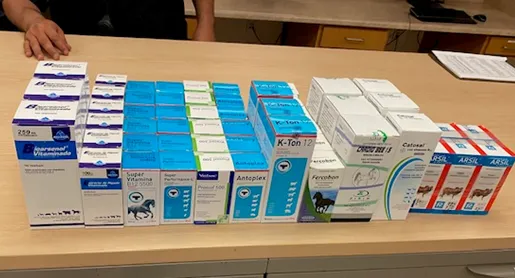EL PASO, TEXAS - U.S. Customs and Border Protection officers working at the El Paso port of entry seized dozens of boxes of horse medications and supplements Tuesday.

The seizure was made shortly after 12 p.m. when a 44-year-old U.S. citizen entered the U.S. from Mexico at the Paso Del Norte crossing. The man declared vitamins to the CBP officer. During a secondary inspection CBP officers discovered a large box containing a variety of prescription animal supplements and horse medications. These are veterinary medications that are considered a class three narcotic steroid and are prohibited from entry.
The driver of the car was assessed a $500 civil penalty. CBP officers seized the products.
CBP has been entrusted with enforcing hundreds of laws for 40 other government agencies, such as the U.S. Fish and Wildlife Service, the U.S. Department of Agriculture and the Centers for Disease Control and Prevention. These agencies require that unsafe items are not allowed to enter the United States. CBP officers are always at ports of entry and assume the responsibility of protecting America from all threats.
The products CBP prevent from entering the United States are those that would injure community health, public safety, American workers, children, or domestic plant and animal life, or those that would defeat our national interests. Sometimes the products that cause injury, or have the potential to do so, may seem fairly innocent.
Before you leave for your trip abroad, you might want to talk to CBP about the items you plan to bring back to be sure they're not prohibited or restricted. Prohibited means the item is forbidden by law to enter the United States. Examples of prohibited items are dangerous toys, cars that don't protect their occupants in a crash, bush meat, or illegal substances like absinthe and Rohypnol. Restricted means that special licenses or permits are required from a federal agency before the item is allowed to enter the United States. Examples of restricted items include firearms, certain fruits and vegetables, animal products, animal by products, and some animals.
Members of the public can educate themselves by visiting CBP’s Know Before You Go webpage.

